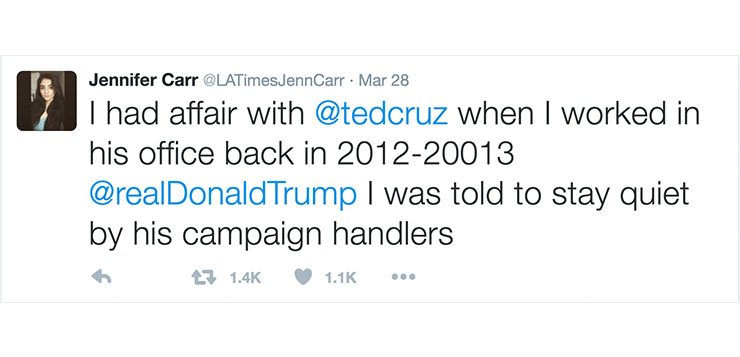
“Well Done, Teddy @tedcruz for tapping this fine ass,” is just one of the eerie Tweets I’d come to discover when I found myself in the middle of a presidential election sex scandal.
Imagine waking up to what seemed like hundreds of Twitter and Instagram notifications, and even emails like these, and realizing someone supposedly named Jennifer Carr was using your profile picture to pose as Republican candidate Ted Cruz’s mistress.
At first glance, I thought the messages asking “Did you have an affair with Ted Cruz?” were a joke or some sort of spam. But then I continued to scroll down to what seemed like a never-ending list of Twitter mentions.
I eventually discovered that a selfie I took this past December had been used as the icon for the Twitter account of this Jennifer Carr. How twisted does someone have to be to think of using an innocent woman’s picture as alleged evidence for an entirely false accusation?
The scariest part of it all was that this person took the time to find me, make sure I was somehow related to the sports world to give “Jennifer Carr” a sports background, and create this elaborate story just to get retweets and gain followers. This guy literally had to buy his followers, just to get the Jennifer Carr account to 20,000 followers. Talk about insanity.
Looking at my story from a broader perspective, I realized it spoke volumes about the significance of careful use of social media. The reality of the matter is that the privacy we might assume exists online simply does not.
Why this person chose me specifically is beyond my knowledge, but it’s a testament to the fact that this could have happened to anyone. Whether they’re pictures or words, nothing you post on social media is completely protected. If this picture was taken from my private Instagram account, is there any real way for people to keep themselves from the same thing happening to them?
Although there may not be a foolproof way of maintaining our privacy online without removing ourselves from social media completely, it’s important to remember we all can choose what we do and do not share online.
I had strangers going through my older tweets, which thankfully contained nothing that could get me in any trouble. They were searching for anything that they could use to insult me. These people had no idea who I even was, but still had the audacity to sit behind a computer and call me “Univision intern scum.”
This experience has made me consider whether or not I am sufficiently safe online. It has made me question if I want to continue a career as a sports journalist. But I think it’s my job to stand up against these kinds of trolls, instead of allowing them to intimidate me out of the realms of social media.
When I first discovered my image was involved in false accusations of an affair with a presidential candidate, I felt somewhat embarrassed to know that my privacy had been violated. It made me realize the Internet was an uglier place than I had already thought. This incident is certainly not the way I’d like my name to be known for, but if anything positive comes out of this story, it’s that my struggle can serve as a reminder for everyone to think twice before posting anything online, and to realize that privacy is nothing more than a figment of our imagination.

